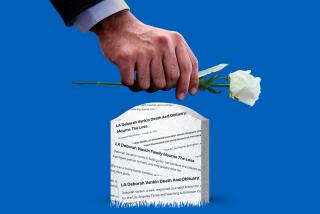Kin of Missing Victims Seek Death Certificates
NEW YORK — As New Yorkers continued grappling with insufferable traffic jams in their post-terrorist city, the relatives of World Trade Center victims began the bizarre bureaucratic process Wednesday of trying to have their missing loved ones declared dead.
Hundreds of family members crammed into the family-assistance center on Pier 94 to fill out affidavits that would help them obtain death certificates even before any remains are recovered.
They moved from booth to booth, consulting with lawyers, priests and insurance agents to complete paperwork enabling them to collect on insurance policies, access bank accounts and execute wills.
Under New York law, it usually takes a court petition and a waiting period of three years to obtain a death certificate for a missing person.
But this week, Gov. George Pataki signed an executive order streamlining the process, allowing families to collect death and government benefits by using sworn affidavits.
Mayor Rudolph W. Giuliani announced that 75 lawyers from the New York city and county bar assns. volunteered their services to help relatives of victims prepare those affidavits and other paperwork. He designated Wednesday through Friday for the task and asked family members to bring driver’s licenses, marriage certificates or other government documents proving they were related to those among the 6,347 listed as missing after the Sept. 11 attacks. (The city has recovered 300 bodies, 232 of which have been identified.)
“They told me that I should bring something in,” said Karen Duarete, adding that she was at the westside pier on behalf of a friend who lost his wife.
“I know that she’s not going to be alive, but he can’t accept it,” Duarete said. “I’m here instead.”
Relatives, some with glazed eyes, wandered among the booths. Law firms, insurance companies and city agencies handed out forms and gave advice. Volunteers at the booth of Cantor Fitzgerald--a brokerage firm that lost about 700 people--met with relatives, giving them the home number of the company’s chief executive officer and making sure that they have money to pay their bills.
At one point, more than 100 people crowded near a booth set up by federal agencies interviewing families about financial need. Workers were so overwhelmed they began asking family members to take a number.
“Number 51, for Medicaid? You’re up,” one worker called.
Families were told that they would have to wait seven to 10 days before hearing from the county and the state about the death certificates.
On Manhattan’s perimeter, meanwhile, frustrated commuters were bracing for traffic restrictions imposed to ease what Giuliani called “horrible” gridlock at the city’s bridges and tunnels.
The mayor ordered police to turn away cars with single drivers entering tunnels or crossing bridges leading to mid- or lower Manhattan between 6 a.m. and noon today and Friday.
Affected are commuters using the Lincoln and Queens Midtown tunnels, and traveling across the Williamsburg, Manhattan, 59th Street and Brooklyn bridges. The Holland tunnel has been closed since the attacks. Drivers with commercial, government or disabled plates will be exempted, as will taxi drivers, motorcyclists, emergency personnel and the media.
Giuliani issued the order after traffic reached a crisis point Tuesday, leaving some snarled up in jams for three hours. The problem was attributed to police checkpoints, scattered rain and a lingering reluctance to use mass transit as the city struggles to get back to normal. Buses were operating at full capacity, but ridership on the subway was at 85% of normal, in part because of closures around the World Trade Center area.
Reviews of Giuliani’s decision were mixed among the commuters and truck drivers inching their way Wednesday from Brooklyn to the Manhattan Bridge checkpoint, where police were waving every truck over for a search.
Some said it was a good move. Others, like 45-year-old Lisa Davis, an occupational therapist who drives alone from one job to another, said the restriction would be a “big problem.”
“Now I’m going through all kinds of machinations,” she said, as she sat in bumper-to-bumper traffic. “Like, when do I take the subway? What day am I going to go with my friend?
“I go teach at night. I need the car to go teach because I can’t come home late from a subway from that school. So I’ve got to figure this out,” she said.
The traffic woes eased a little Wednesday. But drivers said their travel times were still about double the pre-Sept. 11 commute.
“Fuhgeddaboudit,” said one cement truck driver, who gave his name as Ray-Ray. “Traffic in New York City is a disaster at this time. Right now, it’s taking me 45 minutes on a normally 20-minute ride.”
He said the added congestion has tacked three hours onto his 10-hour workday. “I get up at 4, where I used to get up at 7,” he said.
Yet like most commuters, he said he was willing to bear the waits and restrictions with patriotic patience.
“We’re one country, man. We’ve got to stick together. And no one’s going to shut us down. It’s just going to make us strong, that’s what it’s going to do.
“This is New York.”
More to Read
Sign up for Essential California
The most important California stories and recommendations in your inbox every morning.
You may occasionally receive promotional content from the Los Angeles Times.










